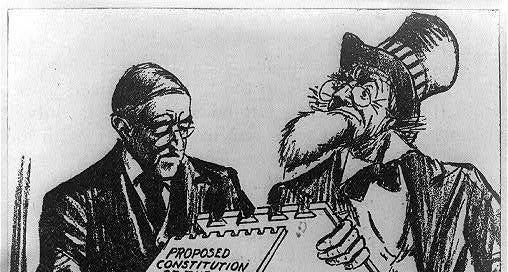This is the third of three posts relating to the historic evolution of our founders’ notion of the United States as an exemplary nation, a beacon illuminating the possibilities of freedom. The first focuses on our founding as the original post-colonial nation, through the statecraft and vision of John Quincy Adams. The second focuses on the nineteenth century, when our ideals as the first post-colonial nation would run into the realities of our continental expansion. This post, the third considers the early-twentieth-century rivalry of Theodore Roosevelt and Woodrow Wilson, advocating alternative visions of the United States as a global power that persist into the twenty-first century.
The Warrior and the Priest
In some respects Roosevelt comes into sharpest focus when he is placed opposite Wilson….One is reminded of Nietzsche’s distinction between the Warrior and the Priest. The Warrior with all his natural strength and virility exults in the free and unabashed exercise of will-to-power. He is the man of true nobility, the man of honor transcending self-interest, the man of uninhibited action and violence….The Warrior perceives that his rival is incapable of true manly pride, selflessness, and honor, which can come only from the unquestioning acceptance of combat. Instead the Priest must conceal his mean and materials soul through the clever manipulation of words and concepts, through the sickly inventions of his own artificial world, which enable him to drug the masses, who worship him as their moral leader. —Robert E. Osgood, Ideals and Self-Interest in America's Foreign Relations: The Great Transformation of the Twentieth Century
The Wilson administration moved with extraordinary speed to mobilize the resources of the nation. Material and munitions were rushed into production. American troops began to reach Europe by early summer, playing a decisive role at the front by winter.
In January 1918 Wilson proposed his “Fourteen Points.” They were intended as unifying war aims. They responded to some of the rationales for the breakout of the war, such as freedom of the seas and trade, and restoration of German-occupied areas in France and Belgium.
Keep reading with a 7-day free trial
Subscribe to The New Nationalist to keep reading this post and get 7 days of free access to the full post archives.





